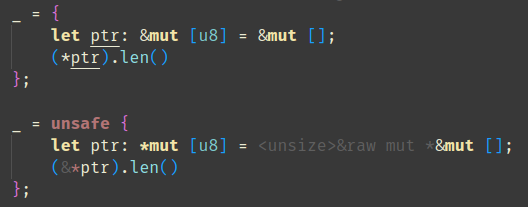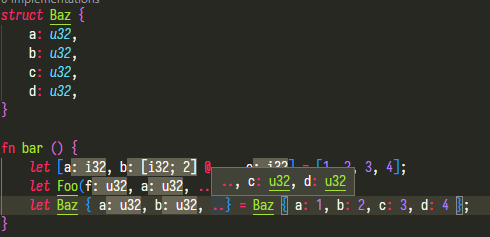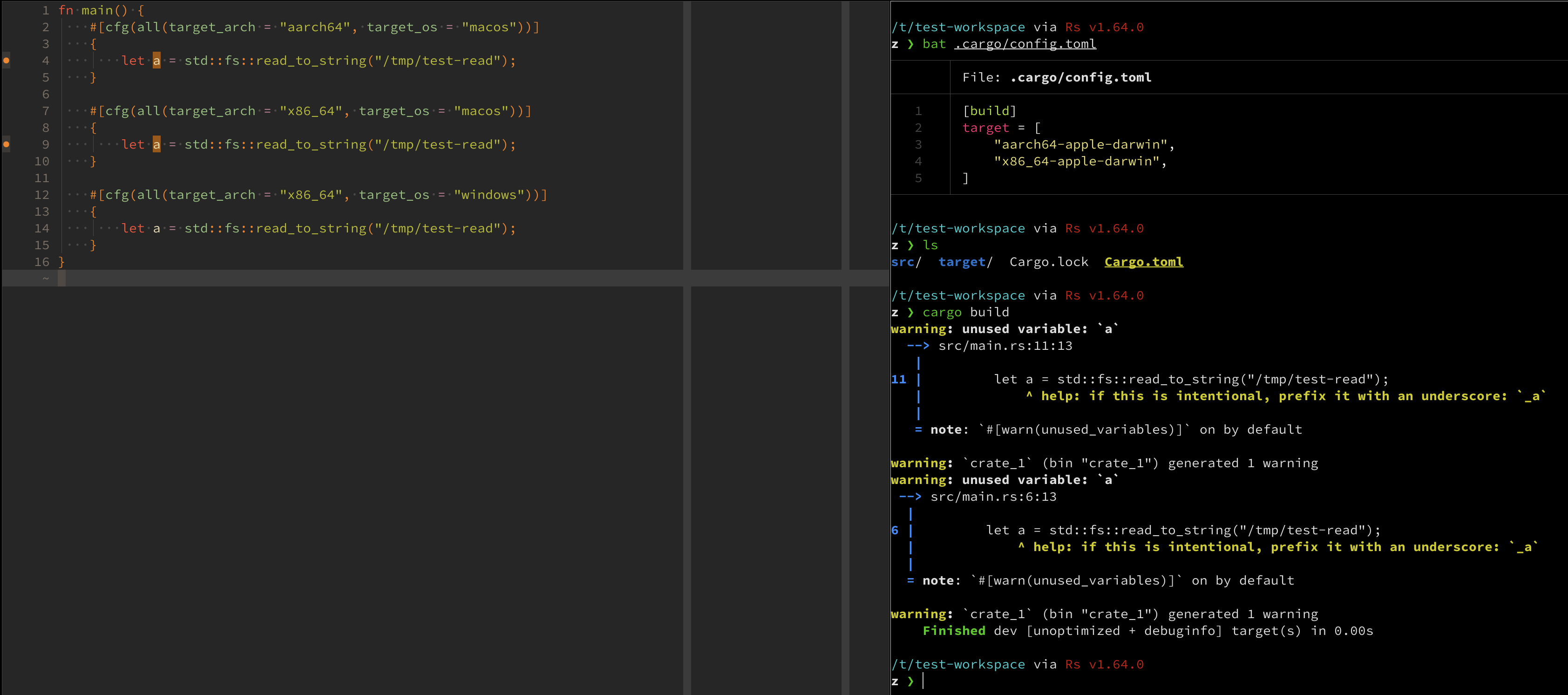fix: handle lifetime variables in `CallableSig` query
Fixes#13838
The problem is similar to #13223: we've been skipping non-empty binders, letting lifetime bound variables escape.
I ended up refactoring `hir_ty::callable_sig_from_fnonce()`. Like #13223, I chose to make use of `InferenceTable` which is capable of handling variables (I feel we should always use it when we solve trait-related stuff instead of manually building obligations/queries).
I couldn't make up a test that crashes without this patch (since the function I'm fixing is only used *outside* `hir-ty`, simple `hir-ty` test wouldn't cause crash), but at least I tested with my local build and made sure it doesn't crash with the code in the original issue. I'd appreciate any help to find a regression test.
* There are a few needless borrows that don't seem to be needed. I even did a quick assembly comparison and posted a q to stackoveflow on it. See [here](https://stackoverflow.com/questions/74910196/advantages-of-pass-by-ref-val-with-impl-intoiteratoritem-impl-asrefstr)
* removed several `let _ = ...` when they don't look necessary (even a few ones that were not suggested by clippy (?))
* there were a few `then(|| ctor{})` that clippy suggested to replace with `then_some(ctor{})` -- seems reasonable?
* some unneeded assignment+return - keep the code a bit leaner
* a few `writeln!` instead of `write!`, or even consolidate write!
* a nice optimization to use `ch.is_ascii_digit` instead of `ch.is_digit(10)`
This makes code more readale and concise,
moving all format arguments like `format!("{}", foo)`
into the more compact `format!("{foo}")` form.
The change was automatically created with, so there are far less change
of an accidental typo.
```
cargo clippy --fix -- -A clippy::all -W clippy::uninlined_format_args
```
Seems like these can be safely fixed. With one, I was particularly
surprised -- `Some(pats) => &**pats,` in body.rs?
```
cargo clippy --fix -- -A clippy::all -D clippy::explicit_auto_deref
```
I am not certain if this will improve performance,
but it seems having a .clone() without any need should be removed.
This was done with clippy, and manually reviewed:
```
cargo clippy --fix -- -A clippy::all -D clippy::redundant_clone
```
feat: Add an option to hide adjustment hints outside of `unsafe` blocks and functions
As the title suggests: this PR adds an option (namely `rust-analyzer.inlayHints.expressionAdjustmentHints.hideOutsideUnsafe`) that allows to hide adjustment hints outside of `unsafe` blocks and functions:

Requested by `@BoxyUwU` <3
fix: Correctly check for parentheses redundancy in `remove_parentheses` assist
This is quite a bunch of code and some hacks, but I _think_ this time it's correct.
I've added a lot of tests, most of which fail with the assist impl from #13733 :')
Complete enum variants without parens when snippets are disabled
This handles the portion of #13767 that bothered me, but I can try to work on the other parts we discussed if needed.
fix: resolve all inference vars in `InferenceResult::assoc_resolutions`
I think this fixes '#13773, ~but still haven't found repro. I'll try finding one so we can have a regression test~.
We should resolve every inference variable in `InferenceResult` after inference is done. We started recording `Substitution`s for each resolved associated items in #13725, but failed to do so which causes crash when analyzing source in IDE layer.
fix: make make_body respect comments in extract_function
Possible fix for #13621
### Points to help in review:
- Earlier we were only considering statements in a block expr and hence comments were being ignored, now we handle tokens hence making it aware of comments and then preserving them using `hacky_block_expr_with_comments`
Seems like I am not able to attach output video, github is glitching for it :(
fix: breaking snippets on typed incomplete suggestions
Possible fix for #7929
Fix the case where if a user types `&&42.o`, snippet completion was still applying &&Ok(42). Note this was fixed previously on `&&42.` but this still remained a problem for this case
Previous relevant PR: #13517
### Points to help in review:
- The main problem why everything broke on adding an extra `o` was, earlier `dot_receiver` was `42.` which was a `LITERAL` but now `42.o` becomes a `FIELD_EXPR`
- Till now `include_references` was just checking for parent of `LITERAL` and if it was a `REF_EXPR`, but now we consider `FIELD_EXPR` and traverse all of them, finally to reach `REF_EXPR`. If `REF_EXPR` is not found we just return the original `initial_element`
- We are constructing a new node during `include_references` because if we rely on `dot_receiver` solely we would get `&&42.o` to be replaced with, but we want `&&42` to be replaced with
### Output Video:
https://user-images.githubusercontent.com/49019259/205420166-efbdef78-5b3a-4aef-ab4b-d892dac056a0.mov
Hope everything I wrote makes sense 😅
Also interestingly previous PR's number was `13517` and this PR's number is `13715`, nicee
feat: allow unwrap block in let initializers
Possible fix for #13679
### Points to help in review:
- I just added a parent case for let statements and it seems everything else was in place already, so turned out to be a small fix
fix: add fallback case in generated `PartialEq` impl
Partially fixes#13727.
When generating `PartialEq` implementations for enums, the original code can already generate the following fallback case:
```rs
_ => std::mem::discriminant(self) == std::mem::discriminant(other),
```
However, it has been suppressed in the following example for no good reason:
```rs
enum Either<T, U> {
Left(T),
Right(U),
}
impl<T, U> PartialEq for Either<T, U> {
fn eq(&self, other: &Self) -> bool {
match (self, other) {
(Self::Left(l0), Self::Left(r0)) => l0 == r0,
(Self::Right(l0), Self::Right(r0)) => l0 == r0,
// _ => std::mem::discriminant(self) == std::mem::discriminant(other),
// ^ this completes the match arms!
}
}
}
```
This PR has removed that suppression logic.
~~Of course, the PR could have suppressed the fallback case generation for single-variant enums instead, but I believe that this case is quite rare and should be caught by `#[warn(unreachable_patterns)]` anyway.~~
After this fix, when the enum has >1 variants, the following fallback arm will be generated :
* `_ => false,` if we've already gone through every case where the variants of `self` and `other` match;
* The original one (as stated above) in other cases.
---
Note: The code example is still wrong after the fix due to incorrect trait bounds.
fix: normalize projection after discarding free `BoundVar`s in RPIT
Fixes#13307
When we lower the return type of a function, it may contain free `BoundVar`s in `OpaqueType`'s substitution, which would cause panic during canonicalization as part of projection normalization. Those `BoundVar`s are irrelevant in this context and will be discarded, and we should defer projection normalization until then.
fix: only shift `BoundVar`s that come from outside lowering context
Fixes#13734
There are some free functions `TyLoweringContext` methods call, which do not know anything about current binders in scope. We need to shift in the `BoundVar`s in substitutions that we get from them (#4952), but not those we get from `TyLoweringContext` methods.
Compute data layout of types
cc #4091
Things that aren't working:
* Closures
* Generators (so no support for `Future` I think)
* Opaque types
* Type alias and associated types which may need normalization
Things that show wrong result:
* ~Enums with explicit discriminant~
* SIMD types
* ~`NonZero*` and similar standard library items which control layout with special attributes~
At the user level, I didn't put much work, since I wasn't confident about what is the best way to present this information. Currently it shows size and align for ADTs, and size, align, offset for struct fields, in the hover, similar to clangd. I used it some days and I feel I liked it, but we may consider it too noisy and move it to an assist or command.
The old value was for the old chalk-engine solver, nowadays the newer chalk-recursive solver is used.
The new solver currently uses fuel a bit more quickly, so a higher value is needed.
Running analysis-stats showed that a value of 100 increases the amount of unknown types,
while for a value of 1000 it's staying mostly the same.
Add `move_const_to_impl` assist
Closes#13277
For the initial implementation, this assist:
- only applies to inherent impl. Much as we can *technically* provide this assist for default impl in trait definitions, it'd be complicated to get it right.
- may break code when the const's name collides with an item of a trait the self type implements.
Comments in the code explain those caveats in a bit more detail.
Fix the case where if a user types `&&42.o`, snippet completion
was still applying &&Ok(42). Note this was fixed previously
on `&&42.` but this still remained a problem for this case
Don't show runnable code lenses in libraries outside of the workspace
Addresses #13664. For now I'm just disabling runnable code lenses since the ones that display the number of references and implementations do work correctly with external code.
Also made a tiny TypeScript change to use the typed `sendNotification` overload.
fix: check tail expressions more precisely in `extract_function`
Fixes#13620
When extracting expressions with control flows into a function, we can avoid wrapping tail expressions in `Option` or `Result` when they are also tail expressions of the container we're extracting from (see #7840, #9773). This is controlled by `ContainerInfo::is_in_tail`, but we've been computing it by checking if the tail expression of the range to extract is contained in the container's syntactically last expression, which may be a block that contains both tail and non-tail expressions (e.g. in #13620, the range to be extracted is not a tail expression but we set the flag to true).
This PR tries to compute the flag as precise as possible by utilizing `for_each_tail_expr()` (and also moves the flag to `Function` struct as it's more of a property of the function to be extracted than of the container).
Mega-sync from `rust-lang/rust`
This essentially implements `@oli-obk's` suggestion here https://github.com/rust-lang/rust-analyzer/pull/13459#issuecomment-1297285607, with `@eddyb's` help.
This PR is equivalent to 14 syncs (back and forth) between `rust-lang/rust` and `rust-lang/rust-analyzer`.
Working from this list (from bottom to top):
```
(x) a2a1d9954⬆️ rust-analyzer
(x) 79923c382⬆️ rust-analyzer
(x) c60b1f641⬆️ rust-analyzer
(x) 8807fc4cc⬆️ rust-analyzer
(x) a99a48e78⬆️ rust-analyzer
(x) 4f55ebbd4⬆️ rust-analyzer
(x) f5fde4df4⬆️ rust-analyzer
(x) 459bbb422⬆️ rust-analyzer
(x) 65e1dc4d9⬆️ rust-analyzer
(x) 3e358a682⬆️ rust-analyzer
(x) 31519bb39⬆️ rust-analyzer
(x) 8231fee46⬆️ rust-analyzer
(x) 22c8c9c40⬆️ rust-analyzer
(x) 9d2cb42a4⬆️ rust-analyzer
```
(This listed was assembled by doing a `git subtree push`, which made a branch, and looking at the new commits in that branch, picking only those that were `⬆️ rust-analyzer` commits)
We used the following commands to simulate merges in both directions:
```shell
TO_MERGE=22c8c9c40 # taken from the list above, bottom to top
git merge --no-edit --no-ff $TO_MERGE
git merge --no-edit --no-ff $(git -C ../rust log --pretty=format:'%cN | %s | %ad => %P' | rg -m1 -F "$(git show --no-patch --pretty=format:%ad $TO_MERGE)" | tee /dev/stderr | rg '.* => \S+ (\S+)$' --replace '$1')
```
We encountered no merge conflicts that Git wasn't able to solve by doing it this way.
Here's what the commit graph looks like (as shown in the Git Lens VSCode extension):
<img width="1345" alt="image" src="https://user-images.githubusercontent.com/7998310/203984523-7c1a690a-8224-416c-8015-ed6e49667066.png">
This PR closes#13459
## Does this unbreak `rust->ra` syncs?
Yes, here's how we tried:
In `rust-analyzer`:
* check out `subtree-fix` (this PR's branch)
* make a new branch off of it: `git checkout -b subtree-fix-merge-test`
* simulate this PR getting merged with `git merge master`
In `rust`:
* pull latest master
* make a new branch: `git checkout -b test-change`
* mess with rust-analyzer (I added a comment to `src/tools/rust-analyzer/Cargo.toml`)
* commit
* run `git subtree push -P src/tools/rust-analyzer ra-local final-sync` (this follows the [Clippy sync guide](https://doc.rust-lang.org/nightly/clippy/development/infrastructure/sync.html))
This created a `final-sync` branch in `rust-analyzer`.
In `rust-analyzer`:
* `git merge --no-ff final-sync` (this follows the [Clippy sync guide](https://doc.rust-lang.org/nightly/clippy/development/infrastructure/sync.html))
Now `git log` in `rust-analyzer` shows this:
```
commit 460128387e46ddfc2b95921b2d7f6e913a3d2b9f (HEAD -> subtree-fix-merge-test)
Merge: 0513fc02a 9ce6a734f
Author: Amos Wenger <amoswenger@gmail.com>
Date: Fri Nov 25 13:28:24 2022 +0100
Merge branch 'final-sync' into subtree-fix-merge-test
commit 0513fc02a08ea9de952983624bd0a00e98044b36
Merge: 38c98d1ff6918009fe
Author: Amos Wenger <amoswenger@gmail.com>
Date: Fri Nov 25 13:28:02 2022 +0100
Merge branch 'master' into subtree-fix-merge-test
commit 9ce6a734f37ef8e53689f1c6f427a9efafe846bd (final-sync)
Author: Amos Wenger <amoswenger@gmail.com>
Date: Fri Nov 25 13:26:26 2022 +0100
Mess with rust-analyzer just for fun
```
And `git diff 0513fc02a08ea9de952983624bd0a00e98044b36` shows this:
```patch
diff --git a/Cargo.toml b/Cargo.toml
index 286ef1e7d..c9e24cd19 100644
--- a/Cargo.toml
+++ b/Cargo.toml
`@@` -32,3 +32,5 `@@` debug = 0
# ungrammar = { path = "../ungrammar" }
# salsa = { path = "../salsa" }
+
+# lol, hi
```
## Does this unbreak `ra->rust` syncs?
Yes, here's how we tried.
From `rust`:
* `git checkout -b sync-from-ra`
* `git subtree pull -P src/tools/rust-analyzer ra-local subtree-fix-merge-test` (this is adapted from the [Clippy sync guide](https://doc.rust-lang.org/nightly/clippy/development/infrastructure/sync.html#performing-the-sync-from-clippy-to-rust-langrust), you would normally use `ra-upstream master` but we're simulating things here)
A commit editor pops up, there was no merge conflicts.
## How do we prevent this from happening again?
Like `@bjorn3` said in https://github.com/rust-lang/rust-analyzer/pull/13459#issuecomment-1293587848
> Whenever syncing from rust-analyzer -> rust you have to immediately sync the merge commit from rust -> rust-analyzer to prevent merge conflicts in the future.
But if we get it wrong again, at least now we have a not-so-painful way to fix it.
Improve goto declaration
Closes https://github.com/rust-lang/rust-analyzer/issues/13599
- goto decl now goes to assoc items of trait declarations over the items of trait implementations
- goto decl now goes to the field declaration (opposed to goto def which shows both the field decl and binding created/local being used)
- also adds back the goto definition fallback that seems to have been dropped at some point.
feat: adds hover hint to ".." in record pattern
Hovering on the "rest" pattern in struct destructuring,
```rust
struct Baz {
a: u32,
b: u32,
c: u32,
d: u32
}
let Baz { a, b, ..$0} = Baz { a: 1, b: 2, c: 3, d: 4 };
```
shows:
```
.., c: u32, d: u32
```
Currently only works with struct patterns.

Add assist to generate trait impl's
resolves#13553
This pull request adds a `generate_trait_impl` assist, which generates trait impl's for a type. It is almost the same as the one to generate impl's and I also reduced the trigger range to only outside the `RecordFieldList`. Also moved all the tests into separate test functions. A few of the old tests seemed redundant, so I didn't port them.
Fix: Handle empty `checkOnSave/target` values
This fixes a regression introduced by #13290, in which failing to set `checkOnSave/target` (or `checkOnSave/targets`) would lead to an invalid config.
[Fixes#13660]
Support multiple targets for checkOnSave (in conjunction with cargo 1.64.0+)
This PR adds support for the ability to pass multiple `--target` flags when using
`cargo` 1.64.0+.
## Questions
I needed to change the type of two configurations options, but I did not plurialize the names to
avoid too much churn, should I ?
## Zulip thread
https://rust-lang.zulipchat.com/#narrow/stream/185405-t-compiler.2Frust-analyzer/topic/Issue.2013282.20.28supporting.20multiple.20targets.20with.201.2E64.2B.29
## Example
To see it working, on a macOS machine:
```sh
$ cd /tmp
$ cargo new cargo-multiple-targets-support-ra-test
$ cd !$
$ mkdir .cargo
$ echo '
[build]
target = [
"aarch64-apple-darwin",
"x86_64-apple-darwin",
]
' > .cargo/config.toml
$ echo '
fn main() {
#[cfg(all(target_arch = "aarch64", target_os = "macos"))]
{
let a = std::fs::read_to_string("/tmp/test-read");
}
#[cfg(all(target_arch = "x86_64", target_os = "macos"))]
{
let a = std::fs::read_to_string("/tmp/test-read");
}
#[cfg(all(target_arch = "x86_64", target_os = "windows"))]
{
let a = std::fs::read_to_string("/tmp/test-read");
}
}
' > src/main.rs
# launch your favorite editor with the version of RA from this PR
#
# You should see warnings under the first two `let a = ...` but not the third
```
## Screen

Helps with #13282
fix: format expression parsing edge-cases
- Handle positional arguments with formatting options (i.e. `{:b}`). Previously copied `:b` as an argument, producing broken code.
- Handle indexed positional arguments (`{0}`) ([reference](https://doc.rust-lang.org/std/fmt/#positional-parameters)). Previously copied over `0` as an argument.
Note: the assist also breaks when named arguments are used (`"{name}$0", name = 2 + 2` is converted to `"{}"$0, name`. I'm working on fix for that as well.
Update several crates to bring support for the new Tier 3 Windows tar…
`cargo t` has passed on Windows 11 with both `x86_64-pc-windows-gnu` and `x86_64-pc-windows-gnullvm` targets.